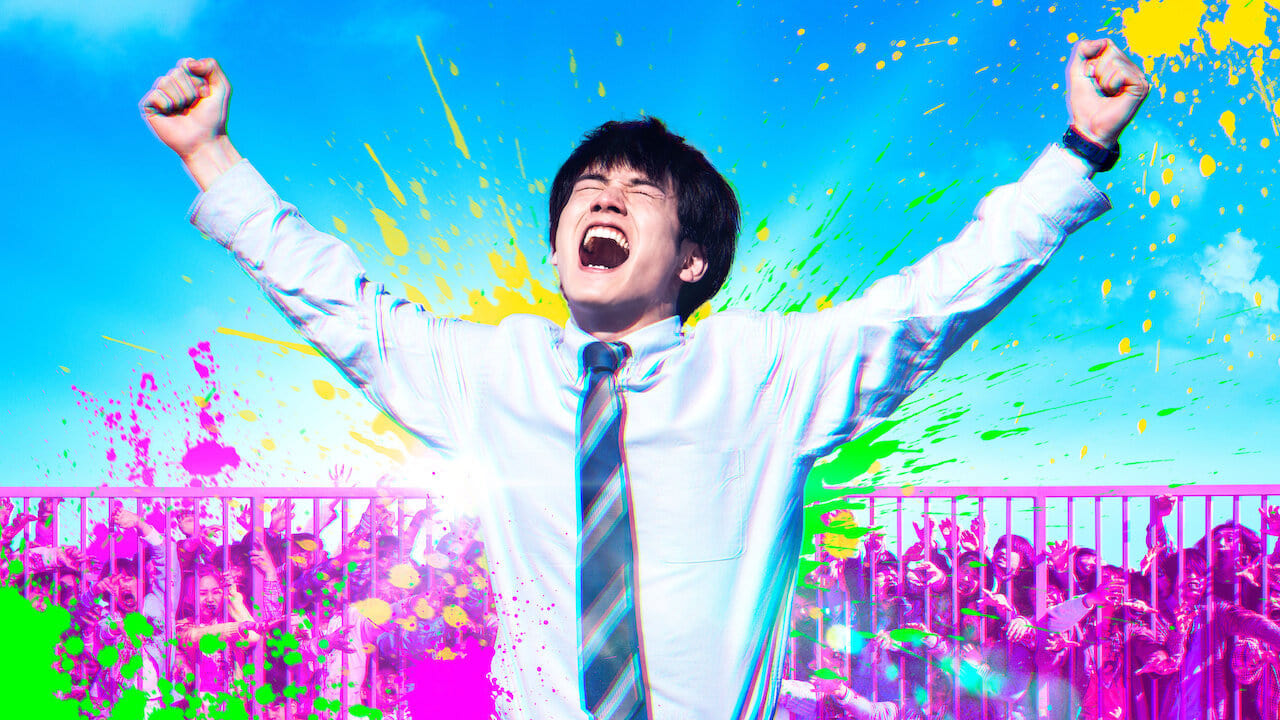Zom 100: Bucket List of the Dead is an enjoyably daft zombie comedy

Now on Netflix, Japanese comedy Zom 100: Bucket List of the Dead sees an office worker drone embracing the end of the world. Luke Buckmaster finds it an amusingly bent vision of an apocalypse.
Movie characters tend to be rather put out by zombie infestations. The genre has shown us many times that nothing disrupts the status quo and slays one’s enjoyment of life like hordes of slobbering undead hungry for human flesh. Director Yûsuke Ishida’s enjoyably daft and dippy comedy Zom 100: Bucket List of the Dead flips the script by presenting a protagonist who views a zombie outbreak as preferable to a zombified existence, slaving away for a crap job and a horrible boss. A bloody apocalypse for everybody else; a spiritual rebirth for him.
Adapting a manga series of the same name, Ishida’s “you do you” message becomes a bit preachy, but makes it clear the film is pitched for a broad audience—far broader than horror enthusiasts. Like in Edgar Wright’s great comedy Shaun of the Dead, zombies provide dramatic scaffolding and help zhuzh up the marketing, but it’s not really horror. For Simon Pegg’s Shaun and Eiji Akaso’s Akira, the protagonist of Zom 100, disintegration of social order is a way to push a Joe Shmoe protagonist out of complacence and into anti-hero status.
Ishida begins in the thick of it, with Akira dressed in a suit and tie running away from a pack of zombies. He exclaims via voice-over: “What the hell? What are those things? Zombies? They’re clearly zombies, right? What do I do? At this rate, at this rate…THEY’RE GONNA MARK ME LATE TODAY AT WORK!”
It’s a pretty good joke. Hardly side-splitting material, but what that scene lacks comedically it makes up for in brisk tone and context-setting. It also does the early work establishing Akira’s view of his day job as the ultimate horror, far scarier than snarling revenants. The narrative then jumps back a year, showing him landing a “job I can be proud of, in a homely atmosphere,” before the protagonist is brought down to earth with a thud. His boss treats him like dirt and expects him to work crazy overtime.
The nadir of Akira’s existence is marked by a scene showing him gazing at train station barriers that prevent people from throwing themselves onto the tracks. “If these gates weren’t here,” he narrates, “I could avoid having to go to work tomorrow.”

But then the apocalypse happens and everything’s tickety-boo. After Akira watches a plane tumbling down from the sky and crashing into a city that’s literally burning down around him, the film hits deliciously dark beats when he looks into the blue sky and says: “I didn’t know just how beautiful the world is.” And we thought that plastic bag-obsessed dude from American Beauty saw lovely things in strange places.
When the time comes to write his titular bucket list, Akira assigns himself some easy tasks—including cleaning his room and dying his hair. Is this an apocalyse or a teenager’s Saturday morning? Thankfully he also jots down: “become a superhero who saves everyone.” Akira’s first foray into hero-esque status involves rescuing a friend who, amusingly, is trapped in a love hotel. None of the action scenes are great but they’re all pretty good. When the film enters into its final act, a fun development (which I won’t spoil) loops back to Akira’s initial predicament, testing his capacity for change.
Zom 100’s bright, air-filled aesthetic visually reminds us that, despite tongue-in-cheek elements, this film’s emotions are genuine and heart-on-sleeve. Ishida’s direction could’ve been punchier, but he keeps the action oriented around Akira, physically and more importantly psychologically, even if that just means returning to the protagonist’s borderline perverse philosophy: that social destruction equals personal and spiritual rebirth. Dollops of brains and bloodshed, not to mention a weird ass zombie shark that features heavily in the trailer, help make palatable a Hallmark message: that it’s better to be dead than dead inside.
















